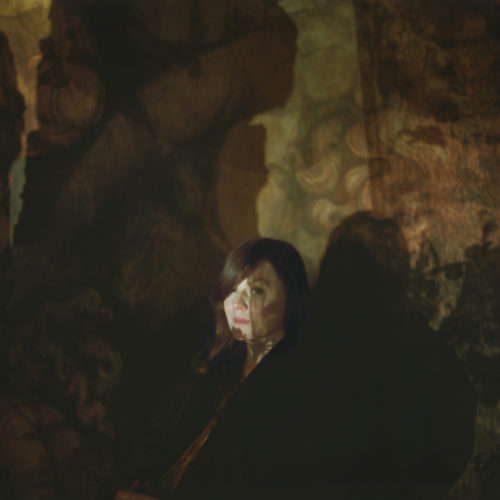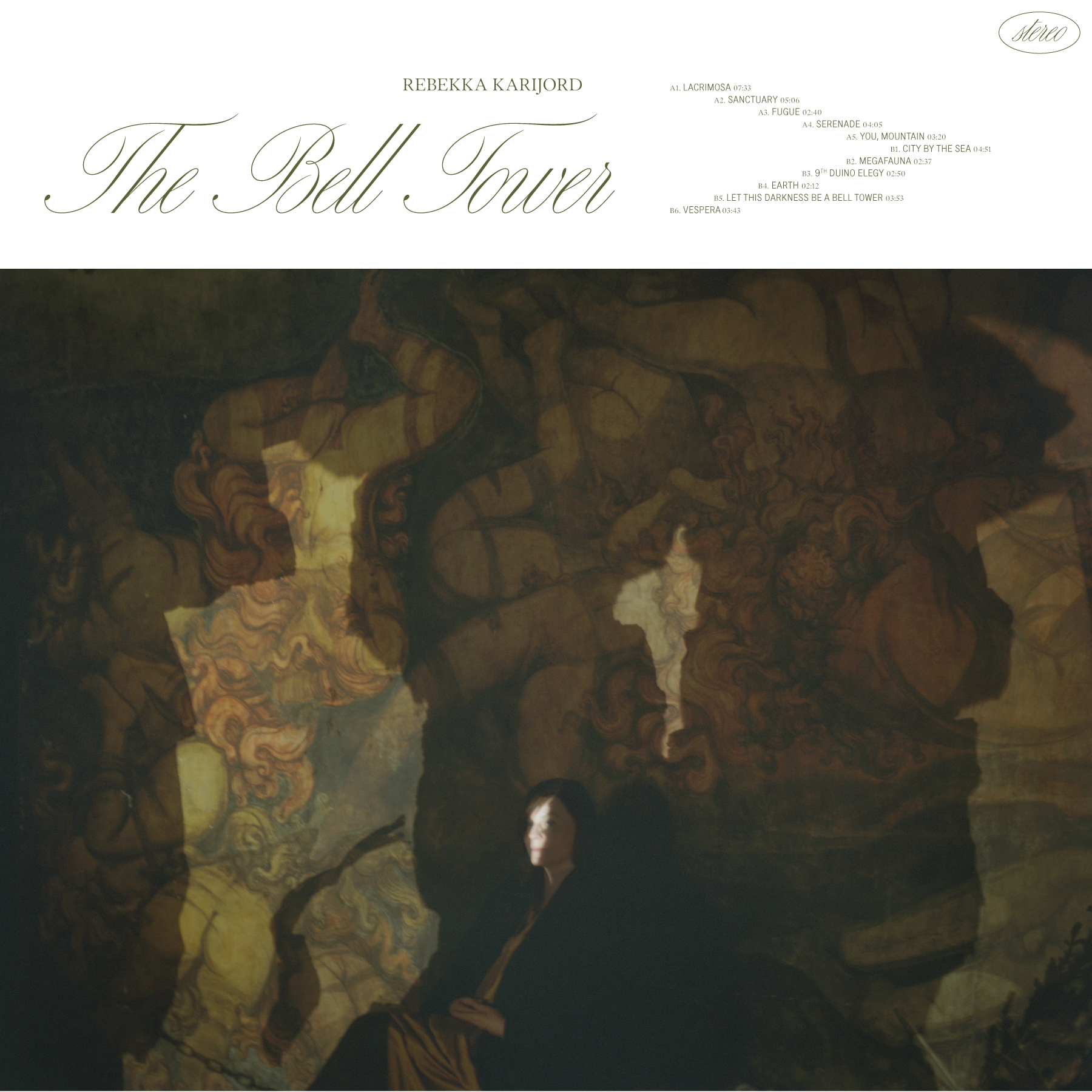
The Bell Tower
—
Release on 25 April 2025
—
Bella Union



From early on in her artistic journey, composer, songwriter, producer, and multi-instrumentalist Rebekka Karijord, has been fascinated by the human voice. Known for her sweeping film scores (like for the Hulu documentary I Am Greta about Greta Thunberg) as well as her work with artist Jessica Dessner and The National’s Bryce and Aaron Dessner in the group Complete Mountain Almanac, she brings a unique musical perspective and skillset to every one of her projects. Even as an 18-year-old music student in her native Norway, she marched to the beat of her own drum: one of her first experimental pieces of music production was composed using only experimental voice techniques —and no other instruments. “I went into the studio and made a piece about an ephemeral girl who only lived for 10 minutes. She came out of an egg, which was a black plastic bag. It was an all vocal piece, which is basically what I’m doing again now. I find it so interesting how creativity is cyclical like that.” Through Rebekka’s career, using voice as a narrative tool has always been a throughline, which brings us to the present moment, one where she is primed to embark on yet another exciting chapter in her discography.
Her seventh solo album, The Bell Tower, is both a return to this vocal-driven approach and one of her most ambitious projects to date. The Bell Tower is many things at once: it’s an ode to our planet in peril; it’s a missive from a mother to her children; it’s a meditation on humanity and our place within the natural world. On top of that, it’s also an experiment, something that evolved from a tiny idea into an all-encompassing work that touches upon 19th-century poetry, environmental activism, and the cross-section of digital and organic instrumentation. There’s admittedly a lot to unpack, which becomes even more impressive when you actually give the album a spin and realize that Rebekka has managed to stack all of these ideas and moods into something that is balanced, harmonious, and at times, even calming. One reason for this is the way she has produced the album–which features voice only–in a way that is as engaging as it is innovative. It takes a great deal of technical knowledge to successfully create experimental or ambient-leaning music, and The Bell Tower’s many complex layers are solidly built by Rebekka’s expertise.
Six years ago, Rebekka connected with the linguistic department at Stockholm University, who specialize in voice research using contact microphones for people with hearing and vocal disabilities. They crafted custom microphones for her, leading to the recording of 25 singers—female, non-binary, and male—from around the world. She then built a unique vocal sample instrument, forming the core of The Bell Tower. “The difference with this instrument is that the singers have very personal voices,” Rebekka explains. “I chose them not for perfection, but for their distinctiveness.”This vocal instrument forms the core of the album, with Rebekka manipulating pitch, air flow, and other characteristics to unlock a rich palette of sounds.
With this experimental vocal foundation in place, Rebekka realized that she had more than just an intriguing sound experiment on her hands—she had a full album. To bring the material to life, she reached out to Roomful of Teeth, the American vocal ensemble known for their pioneering approach to vocal techniques. Their involvement brought a new dimension to the project, allowing Rebekka to score parts for the eight-member ensemble. However, it wasn’t until she listened to an interview with Buddhist philosopher Joanna Macy on the On Being podcast that the thematic core of the album fully crystallized.
“I heard a segment where she spoke about ‘grief over a changing world,’” Rebekka explains. “That became the guiding principle for the album. It was also when I realized I needed to weave Rainer Maria Rilke’s poetry into the mix.” With Macy’s blessing, Rebekka began setting Macy’s translations of Rilke’s work to music. Rilke’s exploration of longing for the natural world and the disintegration of humanity’s connection to it became the emotional and philosophical backbone of The Bell Tower. The album’s title, taken from Rilke’s poem “Let This Darkness Be a Bell Tower,” symbolizes the transformative power of art and its ability to turn fear and grief into something beautiful.
The album’s opening track, “Lacrimosa,” directly samples a portion of the interview with Macy, grounding the record in the themes of loss and climate anxiety that underpin much of the project. Rebekka’s ability to blend spoken word, vocal samples, and choral arrangements creates an atmosphere that feels both ancient and deeply urgent. These elements allow her to confront the massive issue of environmentalism with a reverent, almost spiritual tone.
As the album developed, Rebekka found that she needed to add her own voice to the mix, despite initially thinking of the project as a choir-based endeavor. “I wasn’t planning on having my own voice in it, but after hearing the choir recordings, I realized the album needed a personal anchor,” she says. Rebekka’s voice now serves as a crucial emotional focal point, grounding the experimental elements with her deeply personal perspective. The Bell Tower thus becomes a hybrid between Rebekka’s instrumental world and her singer-songwriter roots.
One of the most emotionally charged moments of the album is “Sanctuary,” a song written as a message to Rebekka’s two young daughters. It’s a meditation on the sorrow and love she feels in the face of climate change, as well as a reflection on the future generations who will inherit the world we leave behind. ““Sanctuary is a song for my daughters–they’re seven and 10–and they grew up in nature, nature is their sanctuary. That’s their safe place. They both know what climate change is, but how do you as a grown up tell a child how drastic it is? It’s so massive to comprehend, and it’s impossible as a parent to look your kid in the eyes and say, ‘This is not going to be like this forever,’ you know? Every story we have, every song we have, everything is based upon this planet.”
Musically, “Sanctuary” reflects this aching sorrow, its placid tones intermingling with its evocative lyrics. “My Daughter, have the Springs gone silent?/Will you ever dare to have a child?” Rebekka sings softly. “Or has the ocean reached your doorstep? And the sun turned hostile?”
Another standout track, “Serenade,” echoes similar themes but with a more meditative tone. It’s a love song to nature, capturing the feeling of surrendering to the beauty of the world and being swallowed by it. The song also touches on the spiritual, with Rebekka describing it as “sounding like a religious experience, but with nature as the church.” The track’s lush harmonies and soaring vocals create a sense of timelessness, even as it evokes the fragility of the natural world.
“Fugue” is the track where the technicality of the sample instrument is at its most bare, with several voices interlocking in uplifting arpeggios. “A ‘fugue’ is a series of movements that reference themselves,” Rebekka explains. “This track is the most processed, with every voice you hear played from the sample instrument, including Roomful of Teeth’s Martha Cluver.” The music captures both the relentless motion of modern life and the cyclical rhythms of nature. “It’s more about form than a song,” she adds, “always forward-moving.”
The album’s production, entirely handled by Rebekka herself, is another defining feature. While she has extensive experience in producing film scores, this marks the first time she has fully self-produced one of her solo albums. She felt strongly that a singular vision was needed to maintain the integrity of the material. “When I do film scores, I’m used to producing everything myself, but I’d always felt I needed distance from my own work. With this album, I was protective of the material. I didn’t want anyone to say, ‘Just add some instruments,’ or ‘Make it more commercial.’” The final mixing, done by David Chalmin, and mastering by Taylor Dupree, brought Rebekka’s vision into focus. “There were challenges working with so many vocal layers,” she admits, “but it was worth it. It was fun, and I learned a lot about the limitations and possibilities of using only the voice.”
The Bell Tower ultimately offers an immersive, reflective listening experience that combines Rilke’s spiritual yearning, Macy’s environmental wisdom, and Rebekka’s own emotional landscape. It’s an album about grief, hope, and the urgent need to reconnect with the planet. Through the artful manipulation of voice, The Bell Tower captures the beauty, the pain, and the transcendence of our shared existence on Earth. Rebekka says. “An idea that has been resonating with me lately, what we need to deeply understand, is that we are all made of the same stardust. When we destroy nature, we are destroying ourselves. That’s what writing this album has been—an attempt to go deeper into that notion.”